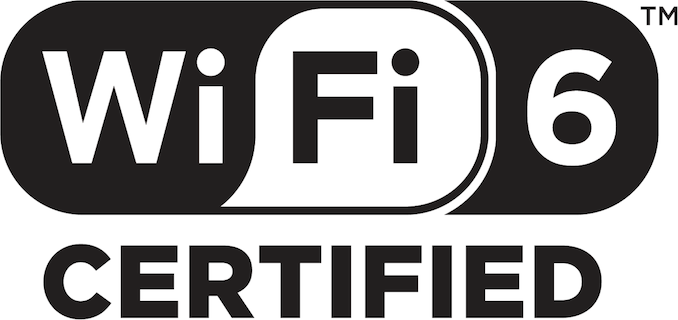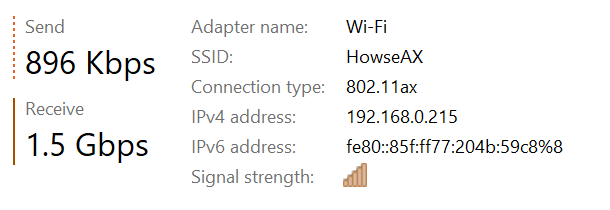AT 101: Wi-Fi 6 And Why You Want It
by Brett Howse on February 12, 2020 8:00 AM ESTTo The Future
If the question is do you need Wi-Fi 6, the answer is most assuredly “maybe”. The performance improvements are substantial, but really rely on a very strong signal to get the most data throughput. Most of the new features of Wi-Fi 6 focus on the influx of devices to the standard, and dealing with many devices connected to the same access point, or devices trying to share spectrum when connected to different access points.
The addition of Orthogonal Frequency Division Multiple Access to the Wi-Fi 6 standard will likely be the most impactful change to this revision. It will allow access points to carve up their channels into smaller slices, allowing more devices to communicate at the same time with less overhead. Each device will lose out on peak throughput, but the reduced latency should help a lot, especially in very dense environments. It should help with excessive overhead on the network layer when multiple devices are sending many small packets at once, which is a very common scenario, especially in an office or stadium situation.
Multi-User MIMO was in the Wi-Fi 5 specification as an optional implementation, and as such it did not really take off. Wi-Fi 6 should make this more prevalent, and also adds support to the MU-MIMO on the uplink, not just the downlink side. This will increase the capacity of access points for higher-speed use cases, but MU-MIMO did not get a lot of traction in Wi-Fi 5 so we will have to see how much adoption it gets in Wi-Fi 6.
The wider 160 MHz channels will offer significantly more throughput in the home environment, as we saw in our performance tests. As with the 1024-level QAM though, to see the biggest benefit you will need a strong signal. The vast majority of home networking is still limited to 1 Gigabit Ethernet, which puts Wi-Fi 6 into somewhat of an awkward spot, since it can transfer faster than most wired home networks, but even so, that is still a significant improvement over Wi-Fi 5 which would cap out around 600 Mbps on the best Wi-Fi adapters. If you work with a lot of large files, and you prefer to use Wi-Fi instead of the more consistent, yet cumbersome Ethernet, there’s still a nice boost to be had.
The future looks strong for Wi-Fi, and the Wi-Fi Alliance has made some excellent revisions to their standard to help improve Wi-Fi for the next generation of devices. As with any standards change, the impacts will not be seen right away. Both the access point, and the client need to be leveraging the new standard for the improvements to be noticeable. We’ve already seen the latest generation of smartphones start to offer Wi-Fi 6, and there’s been some movement in the PC space as well with Intel’s Project Athena. Anyone looking at a new router today should certainly opt for a Wi-Fi 6 model, but there’s likely not a major need for most people to move from Wi-Fi 5 access points right away. If you live in a heavily congested wireless area, the advantages of features like BSS coloring and Spatial Frequency Reuse should help out in those scenarios, but for people looking at purely performance, Wi-Fi 6 somewhat runs into a wall of its own making, since it can now transfer at over Gigabit speeds on a typical 2x2:2 connection. But who are we to question performance?












149 Comments
View All Comments
levizx - Wednesday, February 12, 2020 - link
Because affordable 1Gbps connection isn't a thing for even 90% of high-end buyers yet, let alone > 1GbpsMakaveli - Wednesday, February 12, 2020 - link
If you are in the US then yes internet is terrible in america.Fortunately for me I live in Canada and on a 1Gbps Fiber connection.
triphoppingman - Wednesday, February 12, 2020 - link
This article from 2016 actually says Canadia is barely faster than Mexico.https://www.forbes.com/sites/kevinmurnane/2016/09/...
Wikipedia agrees:
https://en.wikipedia.org/wiki/List_of_countries_by...
Makaveli - Wednesday, February 12, 2020 - link
lol you believe a Wiki Article then.Unless you live in chattanooga or have access to AT&T fiber or google fiber or fios you are pretty much stuck with Cable/dsl for options which are data capped.
Most of our major ISP's in Canada got rid of data caps years ago.
Trust me when I tell you Canadian internet is generally better than what you can get in the US.
imaheadcase - Wednesday, February 12, 2020 - link
Thats pretty subjective though considering Canada population is mostly in one area vs the US.Makaveli - Wednesday, February 12, 2020 - link
Subjective or not its the truth.not trying to get in a population density argument like the Europeans that come in trying to do the same thing lol.
nathanddrews - Wednesday, February 12, 2020 - link
That's the problem with relying on aggregated national data rather than per-market pricing. I can get 1Gbps fiber for $130/mo in my suburb, but 10 miles north of me the only option is dial-up (cheap/slow) or satellite (expensive/slow). 10 miles west of me, there's a smaller fiber ISP offering 2.5Gbps for $150/mo that I can't get. It's not rocket science, just infrastructure and economics.Flipper34 - Wednesday, February 12, 2020 - link
Even out here in the rural midwest we have fiber to the home available. It isn't inexpensive for the higher speeds, but it is available. Our connection was upgraded to fiber at no cost, but we are on a low speed cheap plan! :)Ratman6161 - Wednesday, February 12, 2020 - link
where in the midwest are you? That is certainly not true in Minnesota. I'm about 40 miles from Minneapolis and 200 Mbps is the best I can get. For family about 10 miles out of St Cloud, 40 is the best they can get. further out it goes down from there. Likewise with cellular. the carriers are hyping 5g when there are vast areas in the northern half of MN and WI that cant even get reliable 4G and when the can its only one carrier to choose from.pjcamp - Wednesday, February 12, 2020 - link
For anything not controversial, Wikipedia articles are pretty accurate. I'm a physicist and I'm thoroughly impressed by the physics articles.